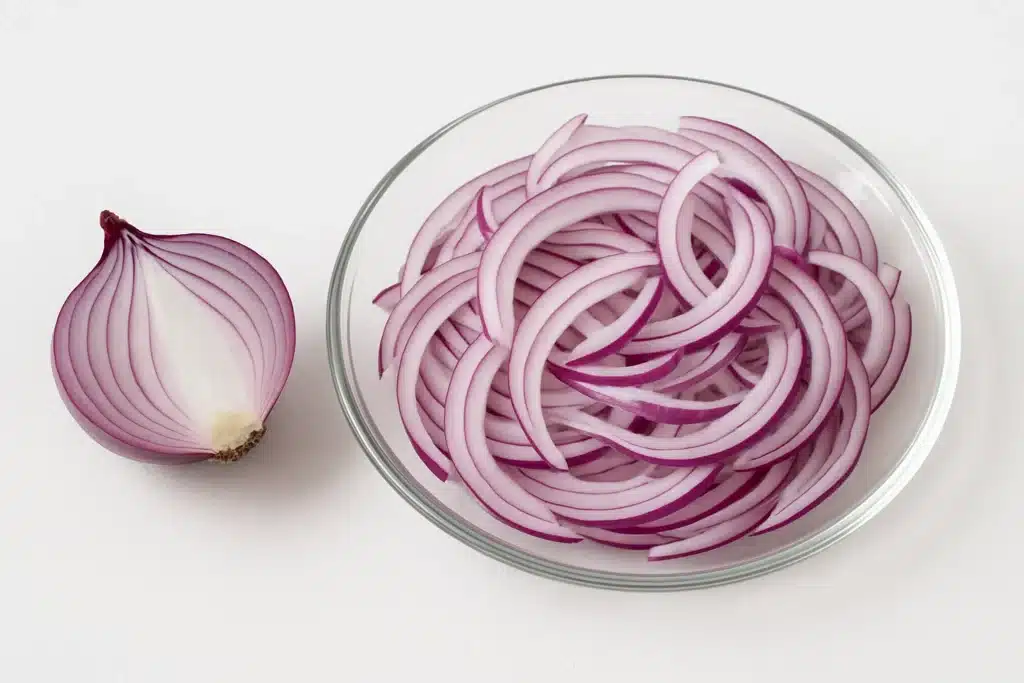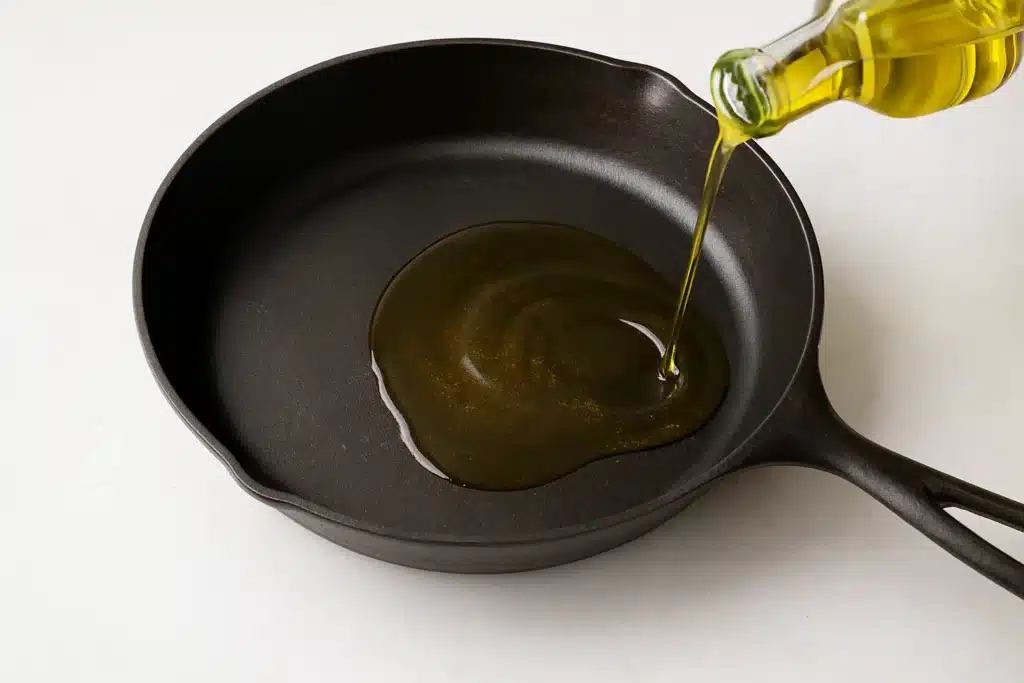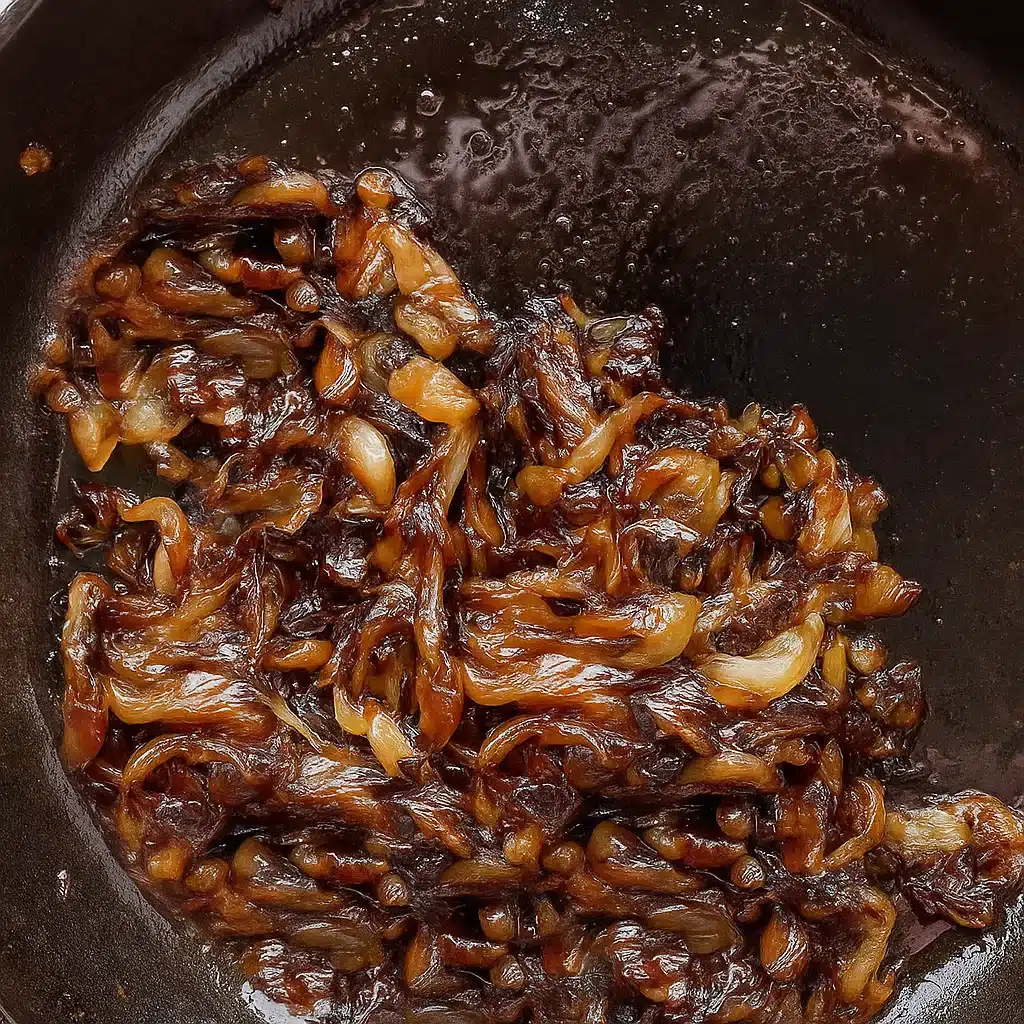There’s something downright magical about caramelized onions. With just a little time and care, humble yellow onions transform into golden, jammy ribbons of sweet-savory flavor. Whether you’re elevating a burger, layering them on pizza, stirring them into dips, or using them as a side dish, these golden beauties add depth and irresistible umami to nearly any meal.
In this article, you’ll learn exactly how to make caramelized onions the right way — no shortcuts, no bitterness, just foolproof techniques. You’ll also discover tips for storage, clever serving ideas, and FAQs that answer every doubt you’ve ever had about caramelizing onions.
Table of Contents
Table of Contents
Why You’ll Love This Recipe
- Simple Ingredients – Only three basic pantry items needed.
- Deep, Rich Flavor – Perfect balance of sweet, savory, and umami.
- Incredibly Versatile – Add to grilled cheese, burgers, soups, or pastas.
- Comforting & Impressive – Elevates any dish and makes it feel gourmet.
- Foolproof Technique – Step-by-step guidance ensures perfect caramelization every time.
Unlike rushed or burned versions, this recipe slowly draws out the onions’ natural sugars, giving you that restaurant-quality richness. The trick? Low and slow cooking — with a few smart tweaks to get perfect results every time.
Ingredients Needed
Here’s what you’ll need to make rich, velvety caramelized onions:
For the base:
- 2 tablespoons extra-virgin olive oil – Use good quality for best flavor.
- 4 medium yellow onions, halved and thinly sliced – Uniform slices cook evenly.
- ½ teaspoon sea salt – Enhances the onions’ natural sweetness.
These few ingredients work like magic together. Want deeper flavor? Try mixing in red or sweet onions for variety.
How to Make Caramelized Onions
Follow these simple steps to master the art of caramelization:
1. Prep the Onions

Slice your onions in half through the root, then into thin, even strips. The more consistent your slices, the more evenly they’ll cook.
2. Heat Your Skillet

Place a 12-inch cast iron skillet (or heavy-bottomed pan) over medium heat. Add the olive oil and let it warm until shimmering — but not smoking.
3. Sauté to Start the Process
Add your sliced onions to the skillet. Spread them evenly and cook for about 5 minutes, stirring occasionally until they start to soften and turn translucent.
This is where the magic begins — you’re building the flavor foundation.
4. Add Salt & Reduce Heat
Sprinkle in the salt. Lower the heat to medium-low, stirring every 4–5 minutes.
Why lower heat? Because slow cooking releases the onions’ natural sugars without burning them.
5. The Patience Game: Slow Caramelizing
Continue cooking for 50 to 80 minutes. Stir regularly. As the onions darken, they’ll shrink and become golden brown, jammy, and sweet. If they dry out or begin sticking to the pan, reduce the heat further and deglaze with a splash of water.
Not brown enough after 50 minutes? Bump up the heat slightly and stir continuously to boost caramelization without burning.
6. Watch the Visual Cues
You’re done when the onions are soft, richly brown, and slightly sticky. No bitterness, no char.

Serving and Storage Tips
Serving Suggestions
- Layer onto burgers, flatbreads, or grilled cheese.
- Stir into mashed potatoes or mac and cheese.
- Serve as a topping on steak or roasted vegetables.
- Use as a base for French onion soup or savory tarts.
Storage & Reheating
- Refrigerate: Store in an airtight container for up to 5 days.
- Freeze: Freeze in small portions for up to 3 months.
- Reheat: Warm gently in a pan over low heat or microwave in short bursts.
Helpful Notes
- Want faster results? Slice onions thinner — they cook more quickly.
- Deglazing tip: Add a splash of balsamic vinegar or wine near the end to boost flavor.
- Batch cooking: Double or triple the recipe and freeze extras for later use.
- Pan matters: Avoid nonstick; cast iron or stainless steel gives the best browning.
- Burned onions? You likely used too high heat. Stick to medium-low or lower.
Conclusion
Perfect caramelized onions are well within your reach — all it takes is a bit of time and care. With just three simple ingredients and the right method, you’ll unlock a flavor bomb that can upgrade almost any dish.
This recipe is a classic for a reason — it’s deeply satisfying, endlessly versatile, and always impressive. If you gave it a try, we’d love to hear from you. Leave a comment and drop a star rating below.
Tried a twist on this recipe? Maybe added some garlic or wine? Tell us — what’s your secret spin on caramelized onions?
And don’t forget to share this with your foodie friends on Pinterest or Facebook.
Frequently Asked Questions (FAQ)
What is the trick to caramelizing onions?
The secret is low and slow cooking. High heat burns the onions and turns them bitter. Stir often, and allow the natural sugars to develop over time. Patience delivers the deepest flavor.
How to caramelize onions?
Slice onions evenly, cook in oil over medium heat until softened, then reduce heat and continue cooking — stirring regularly — for 50 to 80 minutes until golden brown and sweet.
What is a caramelized onion?
Caramelized onions are slow-cooked onions that become soft, sweet, golden brown, and rich in flavor. The natural sugars in the onions break down and deepen during cooking.
Do you caramelize onions with butter or oil?
You can use either. This recipe uses olive oil for a clean, earthy flavor. Butter adds richness and depth but may brown too quickly. For best results, use a blend of both.

Perfect Caramelized Onions
Ingredients
Method
- Slice your onions in half through the root, then into thin, even strips. The more consistent your slices, the more evenly they’ll cook.
- Place a 12-inch cast iron skillet (or heavy-bottomed pan) over medium heat. Add the olive oil and let it warm until shimmering — but not smoking.
- Add your sliced onions to the skillet. Spread them evenly and cook for about 5 minutes, stirring occasionally until they start to soften and turn translucent.
- Sprinkle in the salt. Lower the heat to medium-low, stirring every 4–5 minutes.
- Continue cooking for 50 to 80 minutes. Stir regularly. As the onions darken, they’ll shrink and become golden brown, jammy, and sweet. If they dry out or begin sticking, reduce heat and deglaze with water.
- You’re done when the onions are soft, richly brown, and slightly sticky. No bitterness, no char.
